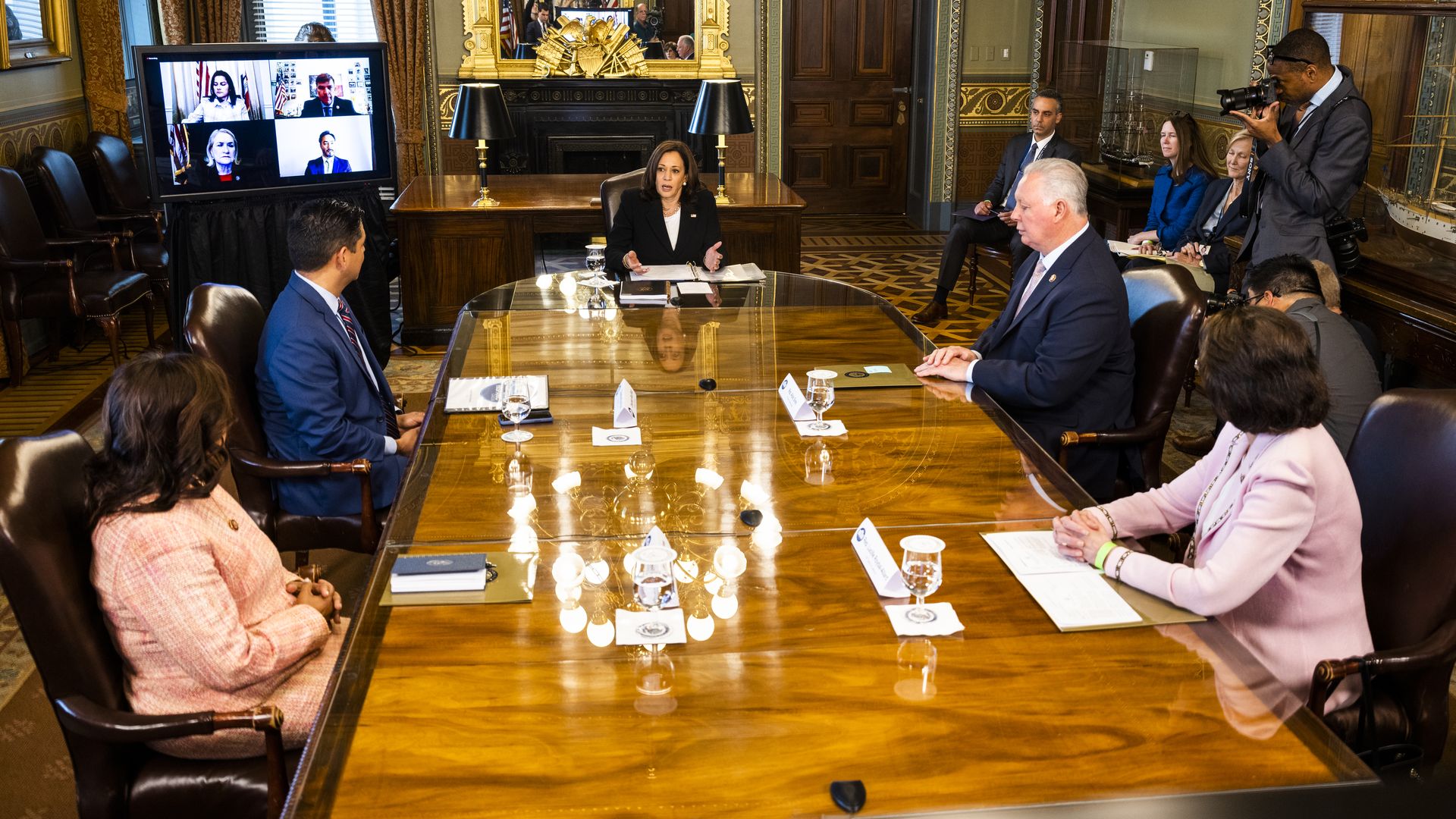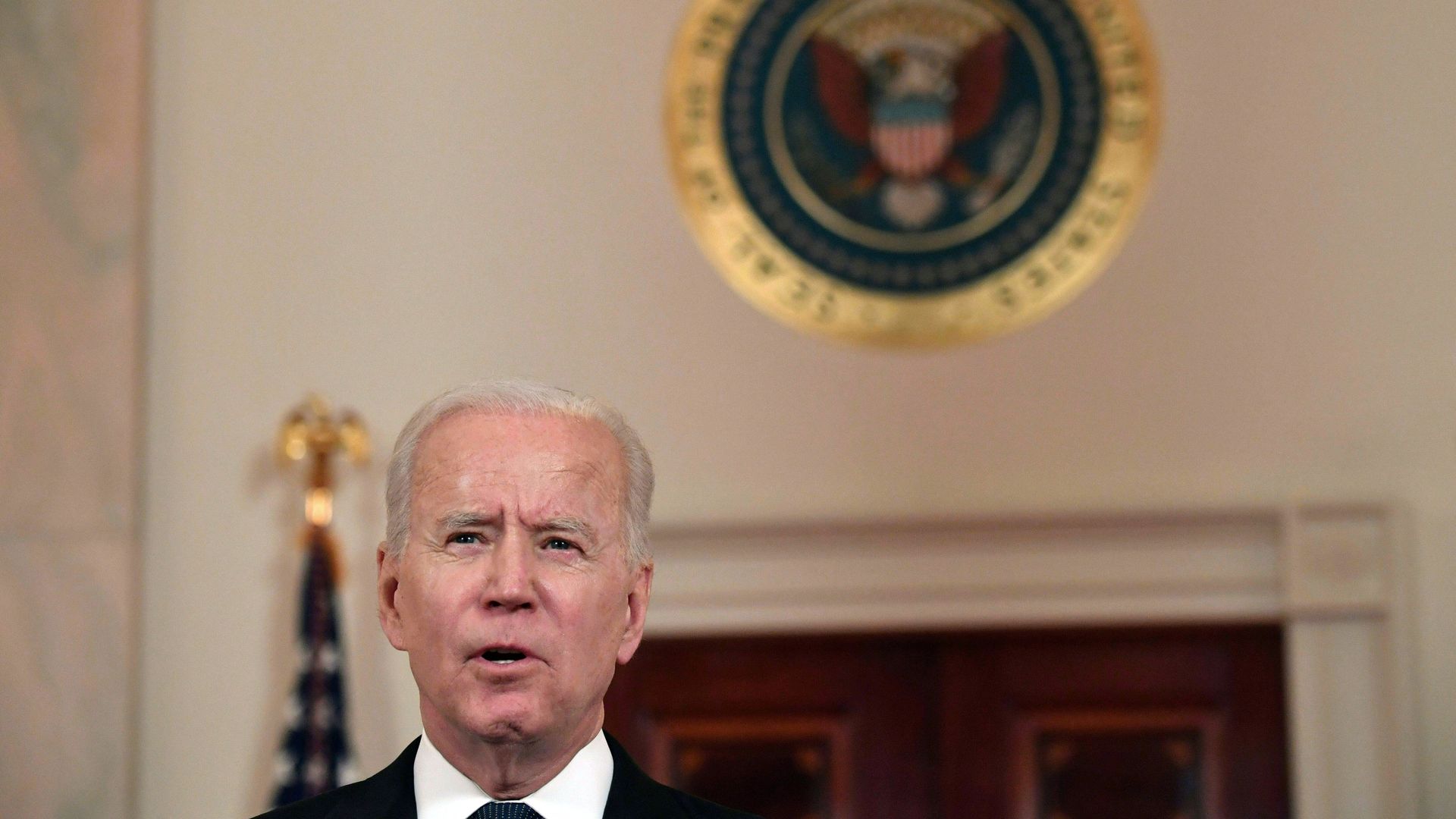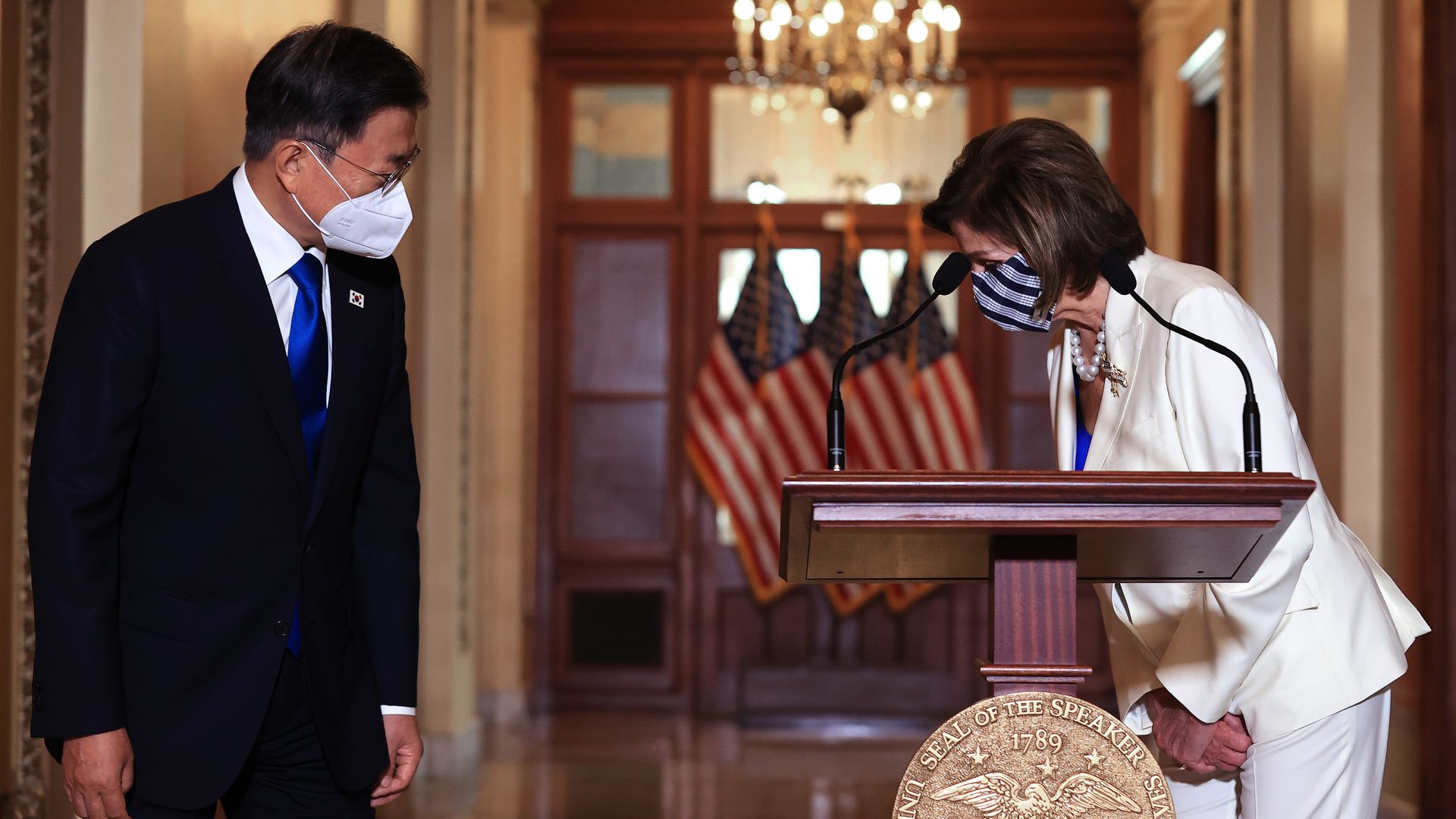| | | | | | | Presented By Emergent BioSolutions | | | | Axios Sneak Peek | | By Alayna Treene, Hans Nichols and Kadia Goba ·May 20, 2021 | | Welcome back to Sneak. It looks as if the Jan. 6 commission debate will reach a crescendo in the Senate next week — 0ne way or another. ⚡ Situational awareness: This is the final issue of Sneak Peek for our Axios colleague Kadia Goba, who's joining BuzzFeed News as a national political correspondent. We're grateful for her scoops, her magnet for sources and her countless hours under the dome. Thank you, Kadia, and all the best for the next adventure! Today's newsletter — edited by Glen Johnson — is 1,614 words, a 6-minute read. | | | | | | 1 big thing: Scoop — VP, CHC discussed digital banking for Northern Triangle |  | | | Vice President Kamala Harris meets with members of the Congressional Hispanic Caucus on Monday. Photo: Jim Lo Scalzo/EPA/Bloomberg via Getty Images | | | | Vice President Kamala Harris and members of the Congressional Hispanic Caucus this week discussed options for micro-lending and digital banking technology in the Northern Triangle to help address a root cause of the immigration crisis, Axios' Kadia Goba reports. Why it matters: Developing infrastructure to disperse foreign assistance more directly is one way to guarantee Central American residents of Guatemala, El Salvador and Honduras receive U.S. support amid concerns about local government corruption. The topic was broached during a CHC meeting with Harris on Monday and gives some insight into one strategy the administration is considering to redistribute humanitarian assistance to people who often feel compelled to seek refuge in the U.S. - The White House also announced $310 million in humanitarian relief and to address food insecurity in the Northern Triangle region in April.
The big picture: Northern Triangle governments have struggled with stability and transparency, which has hamstrung economic success for their citizens. - Environmental disasters, gang violence and, more recently, the COVID-19 pandemic have fueled the desire to migrate north.
- Digital banking technology has increasingly become more popular abroad as a way to quickly distribute foreign aid directly to citizens.
- More people in developing countries have cellphones and can download mobile money applications easier than accessing traditional banking systems.
What they're saying: "There's a whole big segment in most developing countries that don't have access to traditional lending mechanisms, and digital is much quicker, transparent and equitable," George Ingram, a fellow at the Brookings Institution, told Axios. - "And there's less opportunity for corruption," he said. "You don't have the middleman."
But, but, but: Republican lawmakers are expected to resist the idea. - They've been critical of the vice president's work on immigration, calling her out for not traveling to the U.S.-Mexico border to date.
- Increasing money to the region would also be a reversal from the Trump administration, whose strategy was to cut funding to the area.
|     | | | | | | 2. Scoop: HHS prepared to double migrant capacity at Fort Bliss |  | | | Xavier Becerra. Photo: Drew Angerer/Getty Images | | | | Health and Human Services Secretary Xavier Becerra also told the CHC this week he's prepared, if needed, to double the capacity for underage migrants at Fort Bliss, Texas, Kadia and Axios' Hans Nichols have learned. Why it matters: Expanding the capacity at Fort Bliss, where thousands of migrants under the age of 12 could be held, is controversial because it's harder to care for younger children in massive facilities, migrant advocates argue. - Rep. Veronica Escobar (D-Texas), whose district includes the base, asked Becerra about potential plans to increase the number of beds from 5,000 to 10,000, as HHS prepares to close temporary shelters in Dallas and San Antonio.
- Becerra answered by suggesting he didn't have any other options and was open to any ideas from the lawmakers, people familiar with the matter told Axios.
What they're saying: "Secretary Becerra wasn't saying anything new: Some emergency intake sites, including Fort Bliss, are not at capacity and could temporarily and safely house more children — if needed — as we work to unify children with parents and sponsors," said Sarah Lovenheim, a spokesperson for HHS. - "We continue to make significant strides in unifying children safely. Just last week, we unified over 3,300 children with sponsors."
The big picture: HHS's Office of Refugee Resettlement is responsible for housing unaccompanied minors after they're turned over from the Department of Homeland Security. - The transfer is supposed to happen in 72 hours.
- HHS's goal is to then find family members already in the country to host the minors. They typically are allowed into the country, while adults are rejected at the border.
- There are about 20,000 underaged migrants currently in government custody, with HHS scrambling to find them homes — even paying travel costs for adult sponsors to arrive at the shelters to pick up the children, Axios reported in April.
|     | | | | | | 3. Scoop: Committee beef scuttles China higher-ed scrutiny |  | | | Illustration: Eniola Odetunde/Axios | | | | A dispute between two powerful Senate committees effectively scuttled an effort to step up federal scrutiny of foreign donations to U.S. research universities, Axios' Lachlan Markay reports. Why it matters: Chinese influence in higher education has fueled espionage and human rights concerns. But an effort to address it within a sprawling Senate package of measures designed to boost U.S. competitiveness against China sparked a jurisdictional spat that spiked the legislative language. What's happening: The version of the United States Innovation and Competition Act the Senate took up this week explicitly bars the Committee on Foreign Investment in the United States (CFIUS) from monitoring large foreign gifts to U.S. universities. - Despite that prohibition, the legislation includes a measure passed out of the Senate Foreign Relations Committee authorizing that work by CFIUS, an interagency body chaired by the Treasury secretary that vets foreign investments for potential national security concerns.
- The bill, though, was amended Tuesday with additional language explicitly prohibiting CFIUS from performing that work or appropriating federal funds for that purpose.
- While both provisions remain in the overarching bill released by the office of Senate Majority Leader Chuck Schumer (D-N.Y.), the most recent language barring that CFIUS authority appears to be the operative provision.
The big picture: The original CFIUS language was championed by Sen. Jim Risch (R-Idaho), the top Republican on Foreign Relations. - It was designed to address concerns the Chinese government, in particular, uses its influence at large research institutions to monitor or steal U.S. technology, develop tech to repress Chinese Muslim minorities and seed ideologically aligned campus groups.
Between the lines: Three sources with knowledge of the situation told Axios the change in language was the result of a dispute between the Foreign Relations and Senate Banking committees. - CFIUS falls under Banking's purview, and the sources, who requested anonymity to candidly discuss the matter, said Sens. Sherrod Brown (D-Ohio) and Pat Toomey (R-Pa.), the committee's top members, felt they weren't adequately consulted.
Keep reading. |     | | | | | | A message from Emergent BioSolutions | | How Emergent BioSolutions helps to protect public health | | |  | | | | At Emergent BioSolutions, we make things you never thought you'd need. A treatment to counteract an opioid overdose. Protection from anthrax, smallpox and botulism. And now, in the fight against COVID-19. Emergent has an unwavering commitment to helping protect public health. | | | | | | 4. The good cop/bad cop routine on Israel |  | | | President Biden speaks tonight about the Israeli-Palestinian conflict. Photo: Nicholas Kamm/AFP via Getty Images | | | | The juxtaposition of Congress widely criticizing Israel while the president maintains support has created a good cop/bad cop role reversal that isn't going unnoticed in Israel, report Axios' Barak Ravid, Sarah Mucha and Alayna Treene. Why it matters: An increasing number of Democratic lawmakers became frustrated with President Biden this week for his behind-the-scenes approach to the Israeli-Palestinian conflict, Axios found. That's a sea change from a tradition of presidential prominence, as well as unquestioned congressional support for Israel. - Lawmakers said they thought the White House should be more publicly forceful in its efforts to de-escalate the crisis.
- It was only tonight that both sides agreed to a ceasefire, a development that Biden said in hastily arranged White House remarks came after the administration's "intense" and "quiet and relentless" diplomacy that included six calls to Israeli Prime Minister Benjamin Netanyahu.
- In Israel, which had grown accustomed to criticism from President Obama before a respite of support from President Trump, officials came to view the White House and State Department as the "good cop" — weighing in to support Netanyahu's government and blocking problematic initiatives.
What they're saying: "I just wish they would be very forward-leaning and very public on the ceasefire," said Sen. Tim Kaine (D-Va.), a key member of the Senate Foreign Relations Committee. - "As the U.S., we always are weighing in aggressively for a ceasefire whenever there's civilian casualties on both sides of a shooting war. It just seems so odd that the U.S. isn't forcefully doing it. ... I can't really figure it out."
- Democratic senators and their aides have also privately expressed concerns about the lack of a congressional briefing about the issue, sources familiar with the talks tell Axios.
The other side: Israeli ambassador to Washington Gilad Erdan told Israeli media in recent days a change within the Democratic Party — and the growing influence of progressives — had a big impact on how the Gaza crisis played out. - Ravid, author of Axios from Tel Aviv, reports that Erdan said Israel must increase its outreach to minority groups in America to build new bases of support within the left.
- "The mainstream of the Democratic Party supports Israel and supports military aid to Israel," Erdan said on Kan radio. "'The Squad' has grown into a group of 12 members of Congress that are very loud with many anti-Israeli initiatives, and I guess this has a lot of effect."
- Democratic aides agree there's been a clear shift to the left by senators on the Israel issue, guided particularly by Palestinian activists.
Keep reading. |     | | | | | | 5. Biden's Korean War diplomacy |  | | | House Speaker Nancy Pelosi bows to South Korean President Moon Jae-in today. Photo: Chip Somodevilla/Getty Images/Bloomberg via Getty Images | | | | South Korean President Moon Jae-in's visit tomorrow to the White House includes a high honor: a foreign head of state's participation in a Medal of Honor ceremony, Axios' Margaret Talev reports. Why it matters: The decision to include Moon in the honoring of Ralph Puckett Jr., 94, of Georgia, a retired Army colonel and Korean War hero, says a lot about Biden's approach to diplomacy, the military and domestic politics. - Moon, 68, was born months before the end of the Korean War, to parents who fled the North during the war. He later served in South Korea's special forces and as a human rights lawyer.
- This month is Asian American and Pacific Islander Heritage Month — and earlier today, Biden signed an anti-Asian hate crimes bill into law. Last month, he also hired an AAPI adviser.
- AAPI issues also have been in the national spotlight since a series of shootings in March killed six women of Asian descent in Atlanta.
Between the lines: Puckett's age and the recent decision by the Centers for Disease Control and Prevention to relax restrictions on masks and in-person gatherings made the timing of his ceremony a priority — and a possibility. - Nobody at the White House wanted the Medal of Honor to happen via Zoom if they could help it.
But it's not by accident that Moon will be present. The ceremony could just as easily have been yesterday or next week. - Instead, the occasion gives Biden a way to showcase the longstanding U.S. commitment to South Korea's security as well as U.S. veterans, including hundreds of thousands of surviving Korean War vets now in their 90s.
- It also gives Moon a way to show South Koreans and Americans his own relationship with Biden, and the endurance of the alliance and historical connection.
- Last November, then-President-elect Biden made a surprise visit to the Korean War Memorial in Philadelphia for a wreath-laying on Veterans Day.
Keep reading. |     | | | | | | 6. Tweet du jour |  | | | Via Twitter | | | | The second such report this month. |     | | | | | | A message from Emergent BioSolutions | | How Emergent BioSolutions helps to protect public health | | |  | | | | At Emergent BioSolutions, we make things you never thought you'd need. A treatment to counteract an opioid overdose. Protection from anthrax, smallpox and botulism. And now, in the fight against COVID-19. Emergent has an unwavering commitment to helping protect public health. | | | | 🐗 Axios Local is coming to NW Arkansas! Launching Monday, Axios NW Arkansas will distill everything happening in Benton and Washington counties into one smart, concise morning newsletter. Sign up here. 🥂 Thanks for reading Sneak this week. We'll be back Sunday evening. | | | | Axios thanks our partners for supporting our newsletters.
Sponsorship has no influence on editorial content. Axios, 3100 Clarendon Blvd, Suite 1300, Arlington VA 22201 | | | You received this email because you signed up for newsletters from Axios.
Change your preferences or unsubscribe here. | | | Was this email forwarded to you?
Sign up now to get Axios in your inbox. | | | | Follow Axios on social media:    | | | | | |
Post a Comment
0Comments